Understanding Collective Dubai: Insights and Implications
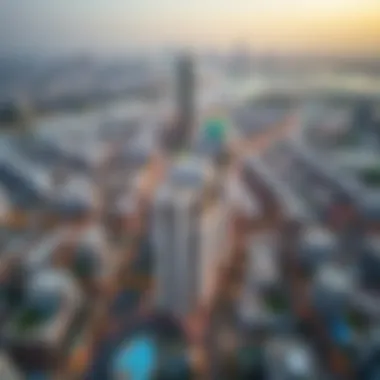
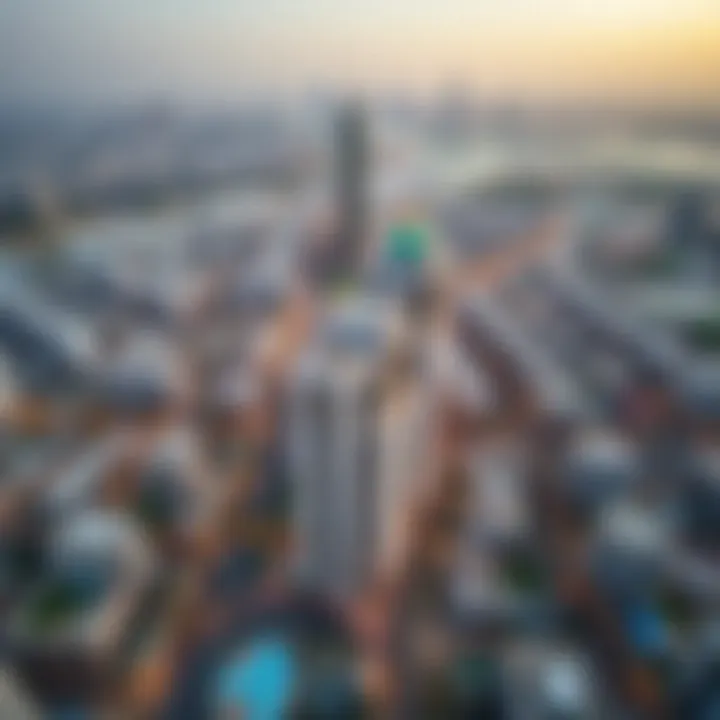
Intro
The landscape of Dubai is not just shaped by its towering skyscrapers and glimmering malls; there's a deeper undercurrent that drives its evolution. This undercurrent is the collective spirit of collaboration, a force that has enabled its real estate, community initiatives, and urban developments to thrive in unique ways. Often, people think of Dubai as an isolated oasis of wealth and luxury. However, when one takes a closer look, it becomes clear that the true power of Dubai lies in the synergy between its residents, investors, and local authorities.
Understanding how this collective ethos influences everything from market trends to investment opportunities helps various stakeholders navigate the vibrant yet complex landscape of the city.
Market Trends
Current Real Estate Pricing
When it comes to real estate in Dubai, prices tell a story of their own. The last few years have seen significant fluctuations, but a noticeable trend is the stabilization as of late 2023. Many new investors are entering the market, lured by the promise of high returns and favorable regulations. In upscale areas like Downtown Dubai, the price per square meter has seen an uptick owing to ongoing demand and limited supply. Conversely, emerging areas such as Dubai South have become attractive for those looking for value.
For instance, average multi-bedroom units can range from AED 1.5 million to AED 4 million, depending on location and amenities. Something worth noting is that while luxury apartments dominate the high-end market, affordable housing options are slowly gaining traction in response to a diversifying population.
Emerging Neighborhoods and Developments
The pulse of Dubai involves more than just established neighborhoods; emerging districts are paving the way for future growth. Al Furjan and Dubai Hills Estate are quickly gaining popularity, not just hosts to residential projects but also becoming focal points for community-centric developments. Investors are paying attention because the potential returns could be substantial.
These areas illustrate a shift towards a more inclusive market, where community initiatives play a pivotal role in shaping the environment. For example, the commitment to sustainability in projects actually attracts buyers. So, what remains are properties that resonate with environmentally conscious values, giving rise to developments that blend community needs with ecological responsibility.
Investment Opportunities
Short-Term vs Long-Term Investment Strategies
Investors often grapple with the choices between short-term flips versus long-term holds in Dubai's real estate market. Each strategy comes with its own perks and pitfalls.
Short-term investments, typically involving quick renovations to flip properties, may yield quick cash flow but come with higher risks and require in-depth market knowledge. On the other hand, long-term investment strategies can be less volatile. Opting for high-quality rentals in established neighborhoods may provide a steady return while the property appreciates over time.
Things to consider:
- Investment goals: Are you looking for immediate cash flow, or do you prefer waiting for appreciation?
- Market stability: Short-term gains can plummet in unstable economic climates.
- Management: Long-term properties can be managed less frequently, while short-term investments need constant oversight.
Financing and Mortgage Options
Navigating the financing landscape in Dubai can sometimes resemble a complex maze, but there are various avenues available for both local and expatriate buyers. Mortgages typically range from 70% to 80% of the property's value, depending on the buyer’s residency status. Traditional banks, as well as specialized mortgage providers, offer various packages that cater to different financial situations.
Prospective buyers and investors should explore:
- Fixed vs. Variable Interest Rates: Fixed offers predictability, while variable might save money over time.
- Loan Tenure Options: Longer-term loans lower monthly payments but increase overall interest paid.
- Additional Costs: Buyers often overlook transaction costs, which can include fees for registration, agent commissions, and maintenance.
Being thoroughly informed about these factors can illuminate whether financing fits an individual's broader investment strategy.
"In a city like Dubai, the collective connection among communities is as compelling as the flawless skyline"
The principles of collective engagement in Dubai’s real estate market encapsulate the ambitious spirit of the city. Future development remains critical, but so does the need to enhance community engagement and sustainable practices. With various neighborhoods evolving alongside fluctuating market trends, the possibilities for investors and homeowners alike are almost limitless.
Prelims to Collective Dubai
The concept of Collective Dubai resonates through the city’s vibrant layers, where collaboration isn’t just a buzzword but a lifestyle. In this sprawling metropolis, every interaction—from the high rises that pierce the sky to the smaller community theaters nestled in quiet neighborhoods—reveals an intricate tapestry woven from the diverse threads of its inhabitants. The significance of diving into this topic lies in grasping how collective consciousness transforms the economic, cultural, and social landscapes of Dubai.
In the bustling trade and tourism hub, individuals and groups form connections that are as dynamic as the city itself. These connections influence behaviors, investments, and overall perspectives towards urban living. Understanding Collective Dubai facilitates an insight into how shared values and ambitions propel development initiatives, encouraging individuals to unite for common purposes.
Benefits of Embracing Collective Consciousness
- Fostering Innovation: Collaborative efforts often spark creativity, leading to groundbreaking ideas across sectors.
- Enhancing Community Resilience: When citizens band together, their collective problem-solving abilities amplify the community’s capability to withstand economic fluctuations.
- Sustainable Urban Growth: Cohesive initiatives encourage thoughtful planning and implementation of eco-friendly projects, ensuring Dubai develops without compromising its heritage and environment.
The importance of exploring how expatriates contribute to this collective framework cannot be overstated. These individuals, hailing from various corners of the globe, bring their unique perspectives, amplifying local customs and traditions. As such, they serve as a bridge, enriching the labor market and shaping the cultural narrative that defines Dubai today. By understanding their role, we gain a clearer picture of the nuances of what makes Dubai a melting pot of opportunities.
As one contemplates the collective spirit, it’s critical to embrace the various dimensions it encompasses. This exploration not only highlights existing collaborations but also sheds light on untapped potential within communities.
"In the heart of Dubai, the collective gains strength through diversity, crafting an identity that is rich, colorful, and ever-evolving."
In the following sections, the discussion will shift toward defining Collective Consciousness and examining the pivotal role of expatriates in shaping this multifaceted environment.
Historical Context
Understanding the historical context of Dubai is paramount for grasping the dynamics of its present and future, especially in the framework of collective efforts that have become synonymous with the city. Dubai's transformation from a modest fishing village to a global metropolis didn't happen overnight; it was a journey marked by pivotal milestones and evolving urban spaces that reflect both local culture and international influences. This section delves into those transitions, revealing the undercurrents that shaped the Dubai we see today.
Evolution of Urban Spaces
Dubai’s urban landscape has undergone a profound metamorphosis over the decades. In the early 20th century, the Emirates were primarily known for pearl diving and trade. However, the discovery of oil in the 1960s acted as a catalyst, triggering rapid urbanization. With oil revenues pouring in, the structures began sprouting, changing the skyline and the lifestyle of its residents.
- Modernization Efforts: Major infrastructural advancements have been crucial. The construction of roads, transportation networks, and public amenities transformed how people interacted with the city. Also, projects like the Palm Jumeirah created embeddings of luxury living that captured global attention.
- Cultural Blend: The integration of various architectural styles serves as a testament to the global influx of different cultures. Where traditional Middle Eastern designs once dominated, one now finds a melange of contemporary skyscrapers and artistic landmarks.
- Urban Planning: Initiatives led by local authorities sought to predict population growth and adapt the urban environment accordingly. Collaborations between public agencies and private players became the norm, driving efficiency and fostering sustainability.
This evolution shows a clear movement toward a city that is flexible in adapting to emerging demands, demonstrating the synergistic relationship between urban planning and community needs.
Key Milestones in Dubai's Development
Several milestones crystallize Dubai's journey toward becoming a leading global hub. Understanding these events helps one appreciate the city’s underlying spirit of innovation and collaboration.
- Formation of Dubai Municipality (1954): This agency started to shape urban planning—setting the stage for future development.
- Establishment of the Dubai International Airport (1960): Marked the beginning of Dubai's ambition in aviation, enhancing connectivity and establishing it as a regional transit hub.
- Launch of Dubai Internet City (1999): Pioneered the concept of free zones aimed at attracting tech firms, which became a cornerstone for the economy.
- Burj Khalifa (2010): The tallest building in the world symbolizes ambition and the heights Dubai has reached in its global standing.
- Expo 2020 Dubai: Expected to shift global perspectives on sustainability and innovation, highlighting Dubai's role on the world stage.
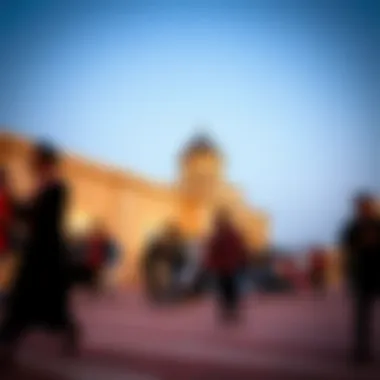

These milestones represent not just brick and mortar achievements but also reflect the collaboration between the government and citizens, reinforcing how collective efforts have significantly impacted Dubai's evolution.
"Dubai stands as a testament to visionary leadership and collective dreams, turning challenges into unparalleled opportunities."
In summary, the historical context provides a vital lens through which to view the collective fabric of Dubai. By understanding the evolution of urban spaces and recognizing key milestones, one can better appreciate the city’s current ambitions and community-driven initiatives. As we move forward, it’s clear that Dubai’s past is an essential narrative that informs and enriches its collective future.
Collective Investments
Collective investments in Dubai represent a crucial aspect of the city's burgeoning economy. They embody a collaborative spirit that not only fuels the real estate market but also fosters community and sustainable development. The essence of collective investments lies in their ability to harness resources from numerous investors, both local and expatriate, culminating in projects that might otherwise be unattainable. This shared investment model enhances the potential for returns and mitigates individual risks associated with real estate ventures.
One of the primary benefits of engaging in collective investments is the pooling of capital. When numerous stakeholders contribute, it increases the purchasing power significantly, allowing for more ambitious projects and investments. For example, instead of a single investor attempting to purchase a vast piece of land, a group can combine their funds to acquire prime real estate in Dubai's competitive market. This strategy not only diversifies risk but also maximizes the investment potential.
Beyond the financial advantages, collective investments encourage community involvement. They often lead to the development of amenities and facilities that cater to a larger populace, enhancing the lifestyle for all stakeholders involved. Social cohesion is naturally fostered when communities participate in development projects—after all, everyone has a vested interest in the outcomes.
Nevertheless, navigating the landscape of collective investments requires a careful approach. Investors must carefully consider factors like regulatory compliance and market volatility. There are also varying degrees of risks tied to collective ventures, which makes thorough due diligence essential. As Dubai is continually evolving, keeping abreast of the latest trends and regulations is paramount for effective investment strategies.
"In a city like Dubai, where the future seems to unfold at lightning speed, collective investments can adapt to changes dynamically, allowing investors to potentially reap returns while contributing to the community’s growth."
Real Estate Syndication Models
Real estate syndication models represent one of the most efficient structures for collective investments in Dubai's property market. These models allow multiple investors to pool their resources together to invest in large real estate projects, which might be too costly for an individual. By engaging in syndication, investors can take advantage of opportunities in Dubai that would otherwise remain inaccessible.
Various syndication structures exist, but one common model involves a general partner who manages the investment—handling everything from the acquisition to management. This partner typically takes an active role, overseeing operations and strategies, while limited partners contribute capital without taking on managerial responsibilities. Such arrangements present a clear division of labor, enhancing efficiency in project execution.
Investors should be mindful of the chosen model and the associated terms of engagement, as they can significantly impact potential returns and individual responsibilities. Thus, prospective investors need to evaluate their risk appetite before committing.
Crowdfunding in the Property Market
On the other end of the spectrum, crowdfunding has emerged as a novel means of collective investment in Dubai’s property market. This approach harnesses technology to connect investors with opportunities, allowing smaller investors to get in on lucrative projects without needing to meet traditional funding thresholds.
Crowdfunding platforms have democratized real estate investment. They enable anyone with a reasonable amount to invest, opening doors to properties that were once exclusive to wealthy individuals or institutional investors. The ease of creating a diversified portfolio through numerous smaller investments reduces risk exposure while fostering community engagement.
However, participants should carefully review each project and its risks, as not all ventures yield profit. Many crowdfunding platforms provide transparency regarding the project's status, offering updates and financial data, which equip investors to make more informed decisions.
In summary, the collective investment landscape in Dubai is rich with opportunities. From real estate syndications to innovative crowdfunding models, investors have various avenues to explore. By understanding the significance and intricacies of these models, stakeholders can become key players in Dubai's architectural and economic fabric.
Community Initiatives
Community initiatives play a pivotal role in shaping the social landscape of Dubai. They not only foster a sense of belonging but also bolster cooperation among residents and expatriates alike. Such initiatives create a platform where various cultures converge, offering shared experiences that bind the community together, serving both practical needs and social aspirations.
Building Sustainable Communities
The concept of sustainable communities is rooted deeply within the broader framework of collective living. In Dubai, this reflects in various ways that enhance both social cohesion and environmental responsibility. For instance, residents come together to manage community gardens, where they grow fresh produce. This not only provides access to healthier food options but also encourages local interactions, allowing people from different walks of life to bond over shared labor and experiences.
Furthermore, sustainability goes beyond just agriculture. Dubai has seen the rise of eco-friendly initiatives, like using solar energy for powering community facilities or implementing water conservation practices. These projects aim to minimize the ecological footprint while providing educational opportunities on sustainability.
Some key aspects of building sustainable communities include:
- Community-Based Projects: Encouraging local involvement in environmental efforts, such as beach clean-ups and tree planting.
- Resource Sharing Models: Platforms where residents can share tools, cars using initiatives like carpooling or co-working spaces for freelancers.
- Education and Awareness: Workshops on sustainable practices can enhance community knowledge, leading to better environmental stewardship.
"Sustainability is not a goal, it is a continuous journey toward creating a better community for everyone."
Cultural Programs and Events
Cultural programs and events in Dubai significantly enrich the social fabric of this cosmopolitan city. They provide a venue for celebration, learning, and interaction among diverse groups. Events such as the Dubai Shopping Festival or Global Village not only attract tourists but also bring residents together to appreciate the multifaceted culture of the city.
Expatriates contribute to this vibrant cultural scene by introducing their traditions, cuisines, and art. Regularly scheduled events, such as music festivals, art exhibitions, and food fairs, showcase the creative talents of local and international artists alike. This blended experience fosters respect and camaraderie among different cultures, creating an atmosphere of understanding.
Some highlights of cultural programs include:
- Festivals Celebrating Diversity: Events that welcome various heritages represented in the UAE, like Diwali celebrations or Eid fairs, serve to unite residents across different backgrounds.
- Art and Music as Bridges: Workshops and performances that encourage participation not only highlight local talents but also allow expatriates to showcase their culture.
- Culinary Experiences: Food festivals that invite participation from different culinary traditions can lead to a mutual appreciation of diverse cuisines.
The role of cultural initiatives in community building cannot be overstated. They encourage connections, foster mutual respect, and ultimately reinforce a collective identity among residents and expatriates alike. Through these shared experiences, Dubai not only survives as a melting pot but thrives on its unique blend of cultures, making it a truly vibrant place to live.
For further reading on community initiatives and their impact, check out Wikipedia or explore case studies on successful projects in Dubai on Britannica.
Engaging in community initiatives goes beyond mere participation; it's about investing in the collective future of Dubai, ensuring that it remains a place where every individual has a stake in the communal good.
Social Cohesion
In the ever-evolving tapestry of Dubai, social cohesion emerges as a fundamental thread weaving together its diverse fabric. The importance of social cohesion cannot be overstated; it fosters a sense of belonging among residents, encourages collaboration, and cultivates a community spirit. For investors and realtors, understanding the mechanisms that underpin this cohesion is essential, as it directly influences market viability and the desirability of various neighborhoods.
The Impact of Cultural Diversity
Cultural diversity in Dubai is like a colorful mosaic, each tile representing a unique heritage, worldview, and set of values. This vibrant mix enriches the collective identity of the city. The local culture is interspersed with traditions brought in by expatriates from different corners of the globe. They contribute not only to the economic landscape, but to the social landscape as well. With over 200 nationalities residing in Dubai, embracing this variety leads to various benefits:
- Enhanced Creativity: Different perspectives often lead to innovative solutions and creative insights in both personal and professional scenarios.
- Broader Understanding: Cultural exchanges promote understanding and respect, reducing prejudice and fostering harmony.
- Economic Resilience: A diverse community attracts varied investments and helps stabilize the economy, especially during uncertain times.
In this melting pot, while challenges exist, such as potential cultural clashes or communication barriers, the opportunities for collective advancement make the effort worthwhile.
Strategies for Inclusion
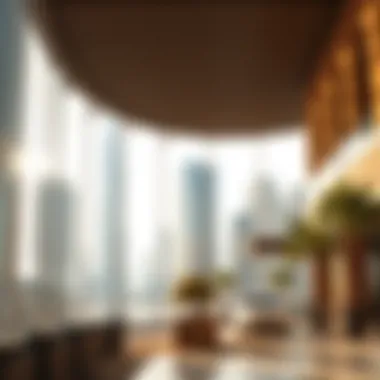

Creating an inclusive environment is pivotal for sustained social cohesion. Implementing effective strategies can ensure that everyone, regardless of background, feels valued and heard. Here are a few approaches that can be adopted:
- Community Engagement Programs: Regular workshops, forums, and events that encourage dialogue among different cultural groups can improve relations and foster understanding.
- Cultural Awareness Initiatives: Education about various cultures and traditions can dismantle stereotypes and build empathy. Schools and community centers can play a vital role here.
- Support Networks: Establishing support networks for expatriates can ease transitions and provide them with a sense of community, reducing feelings of isolation.
"Inclusivity isn’t just a buzzword; it’s a blueprint for future success in a globalized world."
While these strategies require effort and commitment from both individuals and institutions, the long-term benefits for society, economy, and living standards often outweigh the initial challenges.
As savvy investors or homeowners, understanding the nuances of social cohesion is key to navigating Dubai’s real estate market effectively. When neighborhoods boast a high level of social cohesion, they tend to attract higher property values and create more stable communities, showcasing just how interlinked social dynamics and real estate can be.
Economic Implications
Examining the economic implications of Collective Dubai is crucial for understanding how the city has emerged as a global hub of investment, innovation, and collaboration. The dynamics of its economy are shaped by various factors, including collaborative models that enable shared resource utilization and community investments. This makes it not only lucrative for investors but also promotes sustainable growth within the urban landscape.
Growth of Collaborative Economy
The term "collaborative economy" refers to an economic system where services and goods are shared among individuals, often leveraging technology to facilitate these interactions. In Dubai, this is particularly evident in the real estate sector, where platforms like Property Finder and Dubizzle have revolutionized how properties are bought, sold, or rented. This digital transformation empowers buyers and sellers to connect directly, cutting down costs associated with traditional intermediaries.
Accessible platforms have spurred interest in shared living spaces and co-working environments, leading to initiatives such as co-living apartment complexes and flexible office spaces. The rise of such projects promotes accessibility and affordability—an essential factor in a city where expatriates form a significant part of the population.
In this collaborative landscape, companies like Airbnb have also gained traction, allowing property owners to rent out spaces to tourists or short-term tenants. This model boosts local economies through tourism while providing homeowners with additional income avenues.
The collaborative economy facilitates economic flexibility, enabling residents and investors to engage more dynamically with the marketplace. As a result, Dubai steadily evolves, benefiting from this interconnectedness and attracting a diverse range of participants.
Investment Trends in Dubai
Investment trends in Dubai showcase its resilience and adaptability, particularly in light of shifting global market conditions. Over recent years, the city has seen a marked increase in foreign direct investment (FDI), positioning it as a key player on the international stage. Key sectors attracting investments include tourism, technology, and real estate, as they align seamlessly with Dubai's ambitious growth strategies.
Since the introduction of the long-term visa initiatives, not only has there been a surge in expatriate investors, but also the real estate market has become fertile ground for diverse investment opportunities. For example, data from the Dubai Land Department indicates that the volume of real estate transactions hit record highs, driven by attractive pricing trends and favorable regulatory frameworks.
When exploring investment opportunities, potential investors are drawn to several notable factors:
- High Rental Yields: Many areas in Dubai consistently offer attractive rental yields compared to other international cities.
- Stable Currency: The UAE dirham's peg to the US dollar provides a stable macroeconomic environment, appealing to international investors.
- Infrastructure Development: Ongoing projects like the Expo 2020 legacy give rise to new business opportunities.
"Dubai's robust investment landscape continues to attract global attention, showcasing not only potential returns but also an innovative approach to building a thriving economy."
Given these factors, it becomes evident that the collective efforts in building Dubai extend far beyond mere economic metrics. They signal a unified vision that encompasses sustainability, inclusivity, and cooperation—a trifecta crucial for long-term success.
In summary, the economic implications of Collective Dubai are not just a reflection of numbers but an embodiment of how collaboration fosters growth, enabling a multitude of stakeholders—from individual investors to large corporations—to thrive in this bustling metropolis.
For more on investment trends, visit Dubai Department of Economic Development.
Urban Planning and Development
Urban planning and development sit at the very heart of Dubai's rapid transformation from a modest coastal town to a global metropolis. This is of utmost significance, as effective planning not only shapes the physical landscape but also impacts the quality of life for residents and the operational success of businesses. A well-thought-out urban strategy contributes immensely to sustainability, economic productivity, and community cohesion, making it a vital aspect of understanding the collective dynamics of Dubai.
The benefits of robust urban planning in Dubai include increased accessibility, enhanced public spaces, and improved infrastructure. As the city continues to grow, the importance of integrating green spaces and sustainable practices cannot be understated. Fostering an environment where community and nature coexist is a crucial element for long-term resilience in the face of environmental challenges.
However, planning also involves certain considerations. For instance, the diversity of the population means that differing cultural needs must be accommodated in urban designs. Balancing modern architectural styles with traditional elements can be tricky, specifically when trying to create an inclusive community feel in such a diverse area.
Investing in well-planned urban spaces helps to foster stronger communities. It ensures that amenities are accessible, reducing social friction among residents and helping the city function efficiently.
Public-Private Partnerships
Public-private partnerships (PPPs) are pivotal in boosting urban development projects in Dubai. They facilitate shared investment risks and provide avenues for innovation. By joining forces, government entities and private sectors can leverage their strengths—governments provide regulatory support and infrastructure, while private firms often contribute funding and technical expertise.
For example, the collaboration between the Dubai government and private firms on the Dubai Water Canal project showcases the potential for expansive growth through such partnerships. This project not only enhanced recreational opportunities but also streamlined transportation routes, creating new commercial and residential spaces along the waterfront.
One of the key advantages of PPPs is speed. Development projects that typically take years to finalize can often be completed more swiftly due to the pooling of resources. This agility is crucial in a fast-moving and competitive market, where delays can mean lost opportunities.
Innovative Infrastructure Projects
Dubai is synonymous with ambitious infrastructure projects that push the boundaries of what’s possible. These projects exemplify the city's commitment to innovation and sustainability. Notable initiatives like the Dubai Metro and the Al Maktoum International Airport reflect the city’s forward-thinking approach to urban challenges.
Innovative infrastructure goes beyond transportation. The shift towards smart city technologies is fostering a new era in urban development. Implementing IoT solutions helps in managing resources effectively, optimizing energy consumption, and enhancing overall quality of life for residents. For instance, smart waste management systems can efficiently track waste generation patterns, enabling better recycling and reduction strategies.
In addition, the incorporation of renewable energy sources into infrastructure is gradually becoming the norm. Projects that tap into solar energy, such as the Mohammed bin Rashid Al Maktoum Solar Park, set a precedent for future developments, further cementing Dubai's reputation as a leader in sustainable infrastructure.
The interplay of innovative projects and rigorous urban planning lays down a solid foundation for Dubai’s future. As the city continues to expand, these initiatives will likely guide the collective vision of what urban living should entail, ensuring that it remains a vibrant hub for both residents and investors alike.
For more detailed insights into urban development, resources such as Wikipedia and Britannica provide valuable information on various topics surrounding urban planning and infrastructure.
Technological Advancements
As Dubai strides confidently toward its future, technological advancements form the backbone of this ambitious urban landscape. The interplay between technology and collective efforts has profound implications on various sectors, from real estate to governance. Investors and urban planners need to grasp how these innovations create not just smart structures but also responsive environments that can adapt to the growing demands of a diverse population. The drive for efficiency, sustainability, and enhanced quality of life is nowhere more evident than in Dubai.
Smart City Initiatives
Smart city initiatives in Dubai represent a tangible merging of technology with urban life. These initiatives revolve around the concept of leveraging data to improve city services, streamline processes, and enhance the overall living experience. Here are some key features:
- Digital Infrastructure: High-speed internet, robust data networks, and advanced telecommunications are foundational. This infrastructure supports seamless connectivity across platforms, allowing residents and businesses alike to access services swiftly.
- Data Collection and Analytics: Through sensors and analytics platforms, the city can gather real-time data on traffic patterns, energy usage, and even waste management. This data-driven approach leads to proactive solutions that optimize city management.
- Mobile Applications: Applications that allow residents to manage utilities, report issues, or connect with local services are rapidly becoming the norm. Such convenience facilitates better community engagement and ensures citizens feel connected to the civic process.

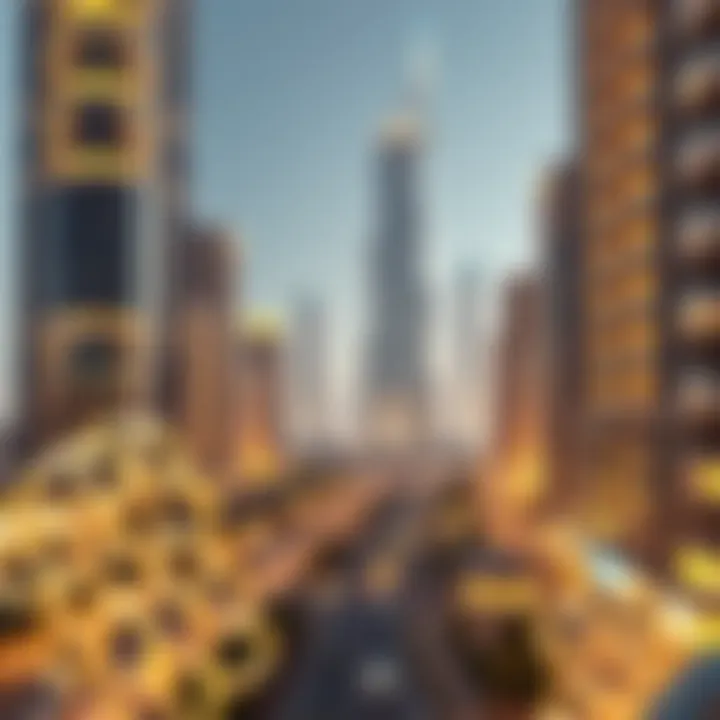
The Dubai Smart City Project signifies the commitment of local authorities to build a sustainable future while fostering a collaborative environment for innovation. As the city continues to evolve, these initiatives present robust investment opportunities that appeal to both local and expatriate communities engaged in the real estate market, enabling a dynamic shift toward communal investment strategies.
The Role of IoT in Real Estate
The Internet of Things (IoT) is ushering in a new wave of advancements in Dubai’s real estate sector. This technology enables various devices and systems to communicate with each other, creating a web of interconnected properties and services. Understanding this role is crucial for investors and realtors looking for opportunities in the burgeoning market. Here’s how IoT is influencing the landscape:
- Smart Home Solutions: Today's homes boast smart appliances, security systems, and climate control, all remotely manageable through smartphones. This trend not only enhances comfort but also promotes energy efficiency — a major selling point for modern buyers.
- Predictive Maintenance: IoT devices allow for continuous monitoring of building systems. By predicting issues before they occur, property owners can mitigate costly repairs and ensure enhanced tenant satisfaction.
- Enhanced Property Management: Real-time monitoring of occupancy and utility consumption helps landlords optimize operational costs and improve resource allocation, fostering a more sustainable approach to property management.
Incorporating IoT technologies creates opportunities for real estate professionals to offer innovative solutions that align with the demands of a rapidly evolving market. This is crucial for attracting both investors and tech-savvy buyers who are interested in sustainable living environments.
"The integration of technology in urban planning is not just a trend, but a necessity for the future of cities like Dubai."
As we consider the implications of such technologies, it’s clear that Dubai stands at the forefront of a technological revolution in city living. To optimize investments, stakeholders need to understand both the potential and limitations of these advancements while remaining attuned to shifts in societal expectations.
Challenges and Considerations
In the ever-evolving landscape of Dubai, recognizing the challenges and considerations surrounding collective efforts is crucial. These elements not only highlight potential pitfalls but also emphasize opportunities for growth and sustainability. As Dubai continues to attract a diverse population and foster a collaborative environment, understanding these challenges can guide investors, expatriates, and urban planners in making informed decisions.
Regulatory Hurdles
One of the significant hurdles faced by those engaged in collective endeavors in Dubai relates to regulatory frameworks. Navigating through laws and regulations can sometimes feel like walking through a minefield. Many potential investors may find themselves stymied by the complexity of local rules, often compounded by differing regulations across emirates. For instance, property ownership rules are notoriously intricate, which can be troublesome for expatriates hoping to invest in real estate.
Key aspects of the regulatory landscape include:
- Licensing Requirements: Mandated licenses for businesses vary in complexity and cost, requiring a thorough understanding of the local laws.
- Land Use Regulations: Different areas in Dubai have specific zoning laws that dictate how property can be utilized, impacting investment decisions.
- Foreign Ownership Restrictions: Certain areas permit only local citizens to own property, thus limiting options for expatriates seeking to invest in real estate ventures.
These barriers can create delays and additional expenses, causing frustration. However, they also present a ripe opportunity for legal consultants and real estate agents to provide valuable guidance. Understanding regulatory frameworks can lead to smoother transactions and successful community engagement.
"Navigating through regulatory requirements is not just about compliance but finding the right partner who understands the landscape."
Economic Volatility
Economic volatility poses yet another challenge, impacting the collaborative nature of Dubai's initiatives. The city's economy, while robust, is not immune to global shifts. Factors like fluctuating oil prices, geopolitical tensions, and international economic trends can lead to instability. This affects investor confidence, thereby influencing collective projects ranging from housing developments to cultural initiatives.
Key factors include:
- Fluctuating Investment Levels: Changes in foreign direct investment (FDI) can significantly alter the landscape, creating hesitance amongst investors, particularly expatriates.
- Market Risk: The unpredictability of the market can deter new investments and lead to hesitations in ongoing projects.
- Job Market Dynamics: High reliance on expatriate labor makes economic conditions particularly sensitive to external shocks, impacting not only employment but disposable income as well.
While these economic uncertainties can present considerable challenges, they also push stakeholders toward innovation. Those engaged in collective efforts may find success through adaptability, striving to incorporate flexible strategies in their projects ranging from community development to business collaborations.
Future Prospects
The landscape of Dubai is not only shaped by its past achievements but is also influenced heavily by the prospects that lie ahead. In the context of collective Dubai, understanding future prospects is paramount for various stakeholders, from investors to policymakers. The insights gained through examining future trends highlight the necessity of collaborative efforts to ensure the city evolves in a sustainable manner. Important elements to consider include urban growth, housing initiatives, and economic strategies—all of which have significant implications on the trajectory of Dubai’s development.
Long-term Growth Strategies
Creating a robust framework for long-term growth strategies involves a multifaceted approach. Developing affordable housing options, implementing environmentally-friendly infrastructure, and promoting entrepreneurship are just a few strategies that must be prioritized. Furthermore, the collaboration between private businesses and governmental bodies is key in executing these strategies effectively.
Investors are increasingly looking towards sectors that offer not only good returns but also align with community values. This shift means that engagement with local stakeholders will be necessary to refine investment avenues, ensuring they meet the needs of residents while driving profitability. Projects that integrate public opinion and foster community engagement stand to benefit immensely, creating a sense of shared ownership and responsibility among the citizens.
- Emphasis on affordable housing
- Infrastructure supporting sustainability
- Entrepreneurial spirit fostering economic diversity
Vision and Its Impact
Vision 2040 serves as a beacon for Dubai's future, aiming to develop a sustainable, inclusive, and resilient city. The plan encompasses a broad range of objectives, focusing on improving quality of life, enhancing urban mobility, and ensuring environmental sustainability. The implications of this vision stretch beyond mere aesthetics; they represent a shift towards a more thoughtful and inclusive development process.
Among the standout features of Vision 2040 will be investment in public transport, integration of green spaces, and a mixed-use development strategy that promotes live-work-play environments. Such measures are not just beneficial for residents but can draw expatriates and tourists alike, bolstering Dubai’s reputation as a global hub.
Moreover, it encourages the embracement of technology and innovation, paving the way for a smart city where data-driven decision-making enhances urban living. The anticipated outcomes are not just economic— they influence social well-being, accessibility, and community bonding.
In summary, the future of collective Dubai hinges on strategic partnerships and innovative planning that emphasize sustainability and community involvement, thus shaping a model that resonates with both investors and residents alike.
"The future is about collaboration, ensuring everyone has a stake in the growth and sustainability of our urban space."
By aligning development initiatives with community objectives, Dubai can pave the way for a future that not only thrives economically but also socially, thereby solidifying its status as a forward-thinking metropolis.
Closure
In wrapping up our exploration of Collective Dubai, we arrive at a junction that underscores the vital importance of understanding the collective efforts shaping this colossal city. In an era where community and collaboration take center stage, recognizing how these elements intertwine with investment, real estate, and urban planning becomes crucial. The collective consciousness of Dubai is not merely an abstract idea; it is a tangible force that drives innovation, growth, and social harmony.
One of the specific elements we should highlight is the role of expatriates, who contribute to an evolving societal tapestry. Their diverse perspectives and experiences enrich communal life, allowing us to see that Collective Dubai is an ongoing narrative rather than a product with a fixed end. Additionally, the drive for sustainability is pivotal. With initiatives aimed at balancing economic growth with environmental stewardship, the city illustrates how collective values can shape policies and practices that are beneficial for future generations.
Moreover, considerations regarding political structures and regulatory frameworks play an undeniable role in the effectiveness of these collective opportunities. The clarity of communication and transparency between stakeholders, including investors and government entities, fosters an environment conducive to shared successes.
Thus, this article reveals that Dubai’s essence lies in its ability to unify diverse aspirations under a shared vision, propelling forward in its quest for prominence on the global stage. Understanding these nuances provides investors and residents alike with valuable insights into how they can contribute and benefit from the collective momentum that defines this dynamic metropolis.
Summary of Key Insights
- Cultural Diversity: The rich tapestry of expatriate life in Dubai not only influences social dynamics but also drives innovative practices in business and community engagement.
- Sustainable Practices: Efforts towards sustainable urban living are not merely trends; they represent a collective commitment to ensure that development does not come at the cost of future generations.
- Regulatory Clarity: Understanding the regulatory landscape is essential for investors looking to navigate Dubai's ever-evolving real estate sector, ensuring that there are no surprises down the road.
- Community Initiatives: Various community projects demonstrate the power of collaboration in addressing local needs while simultaneously promoting a cohesive living environment for residents.
Final Reflections on Collective Dubai
As we reflect on the journey through Collective Dubai, it's pertinent to note that the city is a crystallization of shared efforts backed by individuals, enterprises, and governance. This concept challenges traditional notions of ownership and success, suggesting that real prosperity may lie more in collaboration than competition.
Investors, expatriates, and residents alike must take note of the cultural undercurrents at play. Navigating this unique landscape requires not only a keen business sense but also an understanding of shared community values.
Ultimately, being part of Collective Dubai means engaging with a living ecosystem, working toward common goals, and realizing that in unity, there is strength. This understanding should inspire adaptive strategies moving forward as both the city and its constituents grow together.



